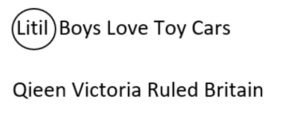What is NAPLAN Language Conventions & How to Prepare Your Child
NAPLAN is the first experience children have of significant standardised testing in their educational journeys, and it can often prove to be an overwhelming and challenging time for them. As parents, you have a vital role to play in ensuring that your child is fully equipped with the knowledge and skills necessary for them to approach their NAPLAN tests with the confidence that they can achieve their goals, whatever level they are at.
One of the best ways to support your child as they undertake NAPLAN testing is to be aware of the different tips and strategies relevant to the subjects under examination, so that you can play an active role in their practice and preparation beyond the classroom.
In this article, you will learn about the tips and strategies related to the NAPLAN Language Conventions portion of the test. For a general NAPLAN guide, see What Is NAPLAN? The Ultimate NAPLAN Guide for Parents (link after publishing).
What Is the NAPLAN Language Conventions Test?
The NAPLAN Language Conventions Test is the third and final part of NAPLAN’s assessment of Literacy. In this section, your child will be tested on their knowledge and comprehension of NAPLAN spelling and NAPLAN grammar, by answering over 50 multiple choice and spelling correction questions. Although this part of the NAPLAN test may appear more straightforward than others, it is still vital that your child prepare for the Conventions of Language questions. Silly mistakes in spelling and grammar are easy to make!
It is a common NAPLAN myth that the test is designed to assess your child’s intelligence. This is not true. The NAPLAN Language Conventions test exists to determine your child’s current competency in NAPLAN spelling and NAPLAN grammar, so that resources can be properly allocated to ensure they have the best opportunity to cultivate their strengths and overcome their weaknesses.
5 Ways to Help Your Child Prepare for the NAPLAN Language Conventions Test
These are five tips and strategies to equip you to help your child reach their potential in the Language Conventions portion of the NAPLAN test, and to avoid many of the common pitfalls that this section can bring!

1. Help Your Child Learn Common Spelling Rules
It is important first and foremost in preparation for the Conventions of Language NAPLAN test for you to review some common spelling rules with your child.
A major part of the test will be for your child to identify and correct spelling mistakes in a given sentence. Sometimes the mistake will be identified by a circle, but otherwise your child will have to find the misspelt word themselves and correct it. For example:

Some of the most common and helpful spelling rules include: “i before e except after c,” “q is always followed by u,” “every word usually has at least one vowel,” “f, l, and s are doubled when placed at the end of one syllable words (stiff, spill, pass),” “watch out for the silent k before words that begin with an n sound (knight, know, knit, knee),” etc.
2. Review Commonly Misspelled Words Together
Not only is it important for your child to know common spelling rules, but it will also be beneficial for them in the Language Conventions NAPLAN test to be familiar with commonly misspelled words. This is necessary because a child might believe that a misspelt word in a sentence is how it is supposed to be spelled and thus not identify it as a word that needs to be corrected.
Some of the most commonly misspelled words are “which/witch,” “their/there/they’re,” “to/too/two,” “believe,” “license,” “separate,” “weird,” “weather/whether,” knew/new,” “beginning,” etc. But there are many others.
Practice Grammar and Punctuation
NAPLAN spelling is not the only component to the Language Conventions NAPLAN test. NAPLAN grammar is also critical.
Ensure that your child understands how full-stops (.), capital letters (A), commas(,), colons (:) and semi-colons (;), question-marks (?), apostrophes (‘), quotation marks (“”), exclamation marks (!), hyphens (-), brackets (), and slashes (/) work.
Your child should also know and understand these basic grammatical terms. They are often called “parts of speech:”
-
- Nouns: Words denoting people, places, things, or concepts (Mum, Australia, Bike, Love).
- Verbs: Doing words (run, swim, read, watch, think, know, ride, look, speak).
- Adjectives: Words that describe nouns (blue, loud, small, stinky, intelligent, dangerous, annoying).
- Adverbs: Words that describe verbs (quickly, always, patiently, loudly, rarely, extremely, more than).
- Prepositions: Words that describe the relationship between two nouns and a verb (in, out, from, beside, on, across, towards, after, below, up) .
- Pronouns: Words that are substitutes for nouns (he, she, it, we, you, they, them, us, this, that, these, those).
- Conjunctions: Words that join together clauses, phrases, and other words in a sentence (and, but, for, because, therefore).
- Articles: The words “the” and “a.” The former describes a “definite” noun (the school), the latter an “indefinite” noun (a school).
3. Get a Tutor
Hiring an English tutor is an excellent way to ensure that your child will be fully equipped with the knowledge and tools they need to reach their potential in the Conventions of Language NAPLAN test.
At A Team Tuition, our Academic Personal Trainers (tutors) are equipped with the expertise surrounding what is assessed in the NAPLAN spelling and NAPLAN grammar portions of the test and are trained specifically to work alongside your child to create the best academic plan that will help them achieve their NAPLAN goals. It’s easy to find a tutor!
4. Give Your Child Emotional Support – NAPLANs Can Be Stressful!
Perhaps the most important thing to remember when assisting your child with their preparations for the Language Conventions NAPLAN test is not to push them to the point of breakdown, but instead to remember to provide them with emotional support and encouragement, as well as academic. This means making sure that they are eating healthy foods, getting plenty of exercise, sleeping well (especially the night before the NAPLAN test), taking study breaks, and receiving words of affirmation and inspiration.
NAPLAN Language Conventions Example Questions
Here are some examples of questions taken from a previous Conventions of Language NAPLAN test. There are questions from each year level. You can use them as revision with your child.
Year 3:

Year 5:

Year 7:

Year 9:

Need a Helping Hand With the NAPLAN Language Conventions Test?
The most important thing for you as parents to remember is to be consistent and resilient in supporting your child. Achieving your child’s goals in the Language Convention NAPLAN test isn’t necessarily going to be something that happens overnight. But never forget that you don’t have to do it alone. Help is always available. This might look like asking your child’s teacher for help, forming a study group with other parents and their children, or working with a private tutor.
Looking to help your child with their NAPLAN language conventions test? A Team Tuition is here to help. With our tried and true tutoring methods, we can help your child succeed in their NAPLAN tests with our at-home and online tutoring. Find a tutor near you today!
